If somebody doesn't do something about those garbage cans, you're gonna see the god-damnedest explosion gonna tear this nation right down the middle!
I caught The Detective (1968) on late-night television recently, halfway through, and was immediately gripped, especially by Frank Sinatra’s brilliant performance; a masterclass in subtlety and style. Directed by the prolific Gordon Douglas (Stagecoach), The Detective is based on Roderick Thorp’s thriller of 1966; set against an edgy, neo-noir-ish background of police brutality, corruption, and homophobia; controversial at the time of its release in 1968. The late 1960s is a fascinating period: a time when America, seemingly, was going to the dogs; the death of the American Dream. Social unrest, urban decay, Vietnam. The tragedy of the Tate-LaBianca murders in the late summer of ‘69. And there’s a bloody good cast, too: Frank Sinatra, Lee Remick and Jacqueline Bisset. Incidentally, Thorp’s sequel, Nothing Lasts Forever, became the basis for the Die Hard franchise, as about as far removed from The Detective (1968) as one might imagine.
Tough-guy Joe Leland (Frank Sinatra) is a cynical, jaded, hard-boiled New York cop. A police detective in a pork pie hat. A character type, of course, we’ve seen many times before, but, for this one, Sinatra owns it. He is what he is. A man of integrity fighting the system; a man who doesn’t play the game. A man prepared to sacrifice his career for the truth. A man who likes to live and let live.
And then the mutilated body of ‘one of the most successful businessmen in the city’ is discovered in his swanky apartment, an especially unsavoury and brutal demise, with, I quote, “semen stains on the sheets”, and temporary boyfriend, Felix Tesla (euphemism ‘room mate’) — a troubled working-class hustler — admits to his murder, albeit under police pressure, and goes to the electric chair. Next, Norma MacIver (Jacqueline Bisset) turns up, suspicious of her husband’s bizarre suicide (a jump from a racetrack rooftop), and that changes everything. Jacqueline’s great. A class act. But I don’t need to remind you of that. Apparently, Mia Farrow (Sinatra’s wife at the time) was initially cast as Norma but turned down the role because the film she was working on (I think it was John and Mary [1969]?) had fallen behind schedule. And then Frank served Mia with divorce papers during the filming of Rosemary’s Baby (1968).
In many ways, The Detective (1968) beats a similar path to the excellent and genuinely underrated Hustle, from 1975, starring Burt Reynolds and Catherine Deneuve — with its world-weary cop, murky surroundings, and contrast between filing cabinet, ashtray and typewriter and glossy, sophisticated apartments and restaurants. And, similarly, there’s a difficult marriage — in the case of Joe Leland, to estranged wife, Karen (Lee Remick). Lee’s great. With eyes to rival Ol’ Blue Eyes himself. Karen’s a glamorous, middle-class academic (is that a contradiction in terms?) — about as far removed from Joe as could possibly be, yet underneath the polish, the smart clothes and the interior decoration, she comes from a difficult background, and like Joe, she’s been around the block (she picks up strange men in bars). And yet, you can understand what she sees in Joe, what really turns her on: “You’re the only real man I’ve ever met.”
The Detective is set in New York and Long Island, although for some reason, I had the impression that it may have been San Francisco, and Dr. Robert’s (Lloyd Bochner) snazzy beach house looks suspiciously like it’s in California, on the Malibu coast, alas, today most likely a heap of smouldering ashes, with its monied pre-Columbian artefacts, sea views, slick bar and serried ranks of framed professional certificates, like a Columbo villain’s lair. Note to self: in another life, I should have been a shrink — or a dog astrologer in Los Angeles, for that matter. Far more lucrative than the world of antiques. As fascinating as it is.
The Detective, I am glad to report, was a box office success. The twentieth highest earning film of 1968, even if Roger Ebert described it (at the time) as (a film) with ’a fine performance from Frank Sinatra, some very good scenes of police work, and not much else… a potentially excellent movie struggling to free itself from a heavy-handed script… and mediocre direction.” And Pauline Kael, The New Yorker film critic wrote: “homosexuality, police corruption, and race relations are exploited in the moralistic ‘outspoken’ style of the screenwriter Abby Mann...”
And yet, despite Ebert’s award of three stars out of four, these criticisms, with hindsight, may, perhaps, be a trifle harsh — especially when viewed with that extra layer of time and association. As I have said before, and don’t mind saying again, old films develop an interesting patina (not unlike antiques or old cars), and sort of grow, and improve, with time — and so need to be viewed in the context of their day. Plus, they’re the antithesis of the contemporary blockbuster (aimed at people with the attention spans of gnats) with their super-quick editing, thrills n’ spills, kidult CGI (yawn) and deafening surround sound: designed, so I understand, to drown out the nefarious munching of rancid popcorn. I kid you not. And that’s a good thing. The old film, not the contemporary blockbuster.
Can Frank act? You bet he can. And, before I forget, there’s a terrific soundtrack too, a slow, sultry, edgy jazz number by Jerry Goldsmith. Goldsmith also composed the soundtrack for another personal favourite, The Mephisto Waltz (1971), starring Alan Alda, Curd Jürgens and Jacqueline Bisset. And looking ahead, I may well pair The Mephisto Waltz (1971) with Donald Cammell’s Demon Seed (1977) — which stars Julie Christie and a decidedly sinister and plummy computer voiced by an uncredited Robert Vaughn. A deliciously twisted weekend double bill to look forward to.
So there we go. The Detective (1968). One for the grown-ups in the room, a sophisticated, above-average, off-the-radar detective thriller, with an emphasis on the subtleties of the film actor’s art — a worthy addition to the WEEKEND FLICKS. archive. It’s a buy. Yet bizarrely, for such a good film, it doesn’t seem to be available on either Amazon Prime Video (at least in Britain) or Netflix; however, I did manage to track down a recording via that Russian social media channel. If you can cope with the Russian stuff, it’s perfectly watchable — if your computer has enough juice, or cache, or whatever it’s called. And there’s a DVD, too, which, at the time of writing, comes in at a bargain £6.23.
Before I go, a quick word about the paid subscription, which costs £5 a month or £50 a year. Paid subscribers get their own special post on Friday mornings, extra bonus recommendations on High Days and Holidays, and access to the entire archive — now running at 162 films. The Sunday morning posts are free and can be read by anybody and everybody. I hope you enjoy The Detective (1968) as much as I did. Bourbon for this one. On the rocks. Back on Friday. Until then, Ciao.




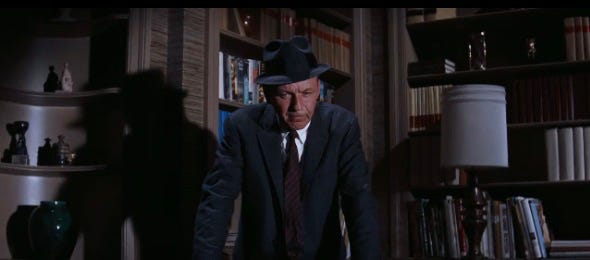
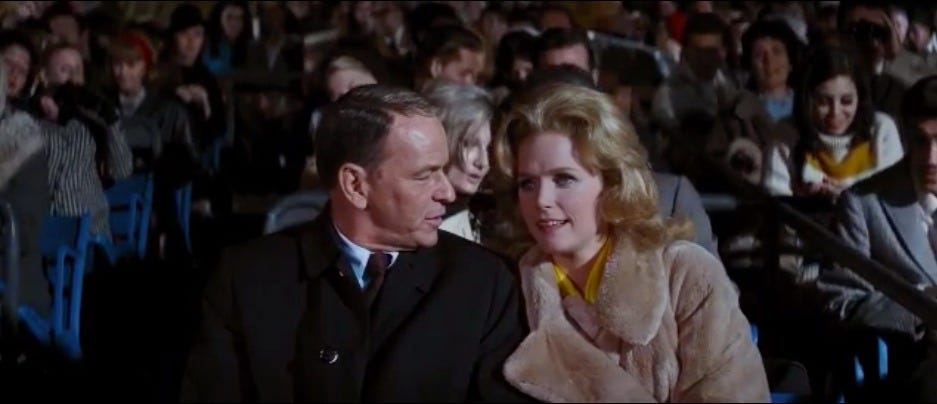
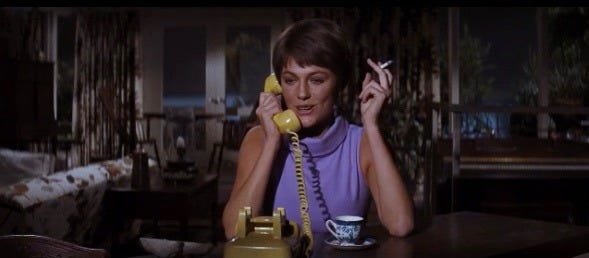
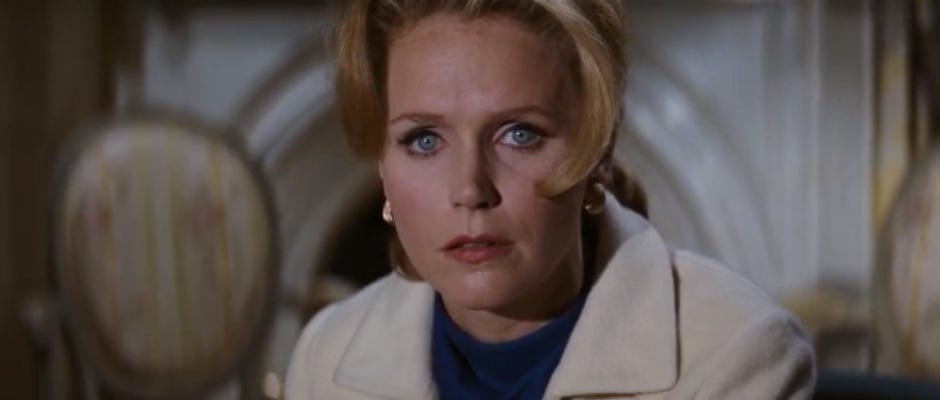




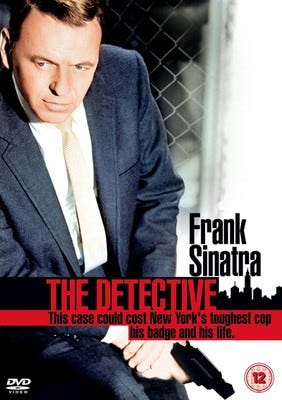
What riches you have uncovered!
John and Mary was Mia with Dustin Hoffman and it wouldn’t surprise me if it was delayed by Hoffman’s method colliding with Farrow’s flower child vibe and more limited experience. I was in love with Mia Farrow but wouldn’t make huge claims for her experience at that point.